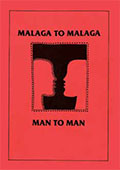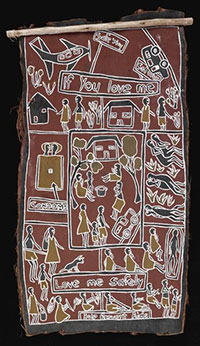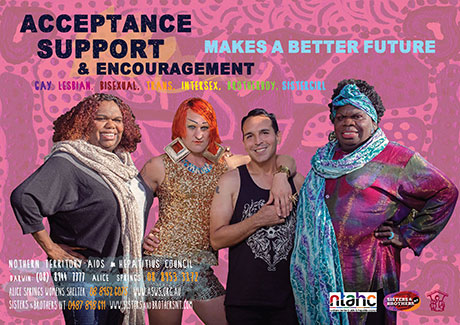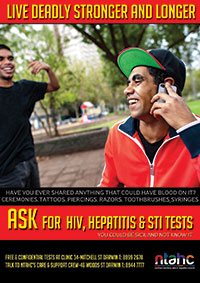Responding to HIV among Aboriginal and Torres Strait Islander people in the Northern Territory
Responding to HIV among Aboriginal and Torres Strait Islander people in the Northern Territory
HIV Australia | Vol. 13 No. 3 | December 2015
By David Aanundsen
Although the AIDS pandemic reached Australia in 1984, it was not until a decade later that funding was allocated for Aboriginal and Torres Strait Islander programs at AIDS Councils, and Aboriginal responses to HIV began being led around Australia.
In Alice Springs in 1994, a non- Aboriginal man and Alice Springs resident, Phil Walcott, and Aboriginal man, John Cross (deceased), collaborated to secure Commonwealth funding and were involved in coordinating the first National Aboriginal, Torres Strait Islander Gay Men and Transgender Sexual Health Conference, held at Hamilton Downs.
The Anwernekenhe conference set precedents through a series of recommendations for responding to the needs of Aboriginal and Torres Strait Islander gay men and transgender people, not only in the area of HIV/ AIDS but also regarding broader sexual health and mental health needs.
In 2015, Arnwernekenhe 6 is celebrating 21 years, and returned to Alice Springs to host its sixth conference.
The Northern Territory AIDS and Hepatitis Council (NTAHC) currently participates in the Anwernekenhe National HIV Alliance with membership on the Board; NTAHC participated in the Anwernekenhe conference, along with other representatives from HIV organisations across Australia.
Paving the way: the Malaga to Malagareport
Initially, addressing HIV among Aboriginal people1 in the Northern Territory (NT) – particularly among gay men and other men who have sex with men – was difficult, as there was little research or information available on the needs and concerns of these populations during the 1990s.
Gary Lee, a Larrakia man involved in the first Anwernekenhe conference as an NT representative in 1994, went on to By David Aanundsen address this dearth of knowledge.
Gary first became involved with the NT AIDS Council in 1995 through his employment at Danila Dilba Aboriginal Medical Service, when his position was placed in the AIDS Council as an outreach worker.
Gary’s brief was to work with Aboriginal people who identified as gay, bisexual, transgender or who used injecting drugs. It was at this time that Gary started work on gathering evidence to support the needs of Aboriginal people in relation to HIV/AIDS.
 His groundbreaking 1996 report, Malaga to Malaga (‘Man to Man’), examined issues faced by the Aboriginal gay male community in Darwin and assessed the priority HIV/AIDS needs of this population.2
His groundbreaking 1996 report, Malaga to Malaga (‘Man to Man’), examined issues faced by the Aboriginal gay male community in Darwin and assessed the priority HIV/AIDS needs of this population.2
The recommendations of the report helped create a roadmap that sought to ‘inform and lead to future planning, design, and delivery of more appropriate and informed education programs’.3
Gary’s achievements also helped in initiating the implementation of the Northern Territory AIDS Council’s service delivery program for these target populations.
Gary continued his research, and contributed a number of other publications on Aboriginal gay men’s and transgender populations.4
In 2015, NTAHC recognised Gary’s outstanding contributions to the objects of the Northern Territory AIDS and Hepatitis Council by awarding him a Lifetime Membership Award.
NTAHC’s Aboriginal Sexual Health (ASH) program
NTAHC has been providing services across the NT since the late 80s, and in 2016 will celebrate its 30th year of incorporation.
In 2003, the organisation changed its name from the NT AIDS Council to the Northern Territory AIDS and Hepatitis Council (NTAHC), to reflect a broadening of its scope to include hepatitis alongside HIV/AIDS.
During its history, NTAHC has provided services to people with blood borne viruses (BBVs), working predominantly with gay men, sex workers, people who use injecting drugs and Aboriginal and Torres Strait Islander people.
The NTAHC ASH program operates from Darwin and Alice Springs, and is staffed by Darren Braun, Aboriginal Sexual Health Promotion Officer and David Aanundsen, Aboriginal Sexual Health Coordinator.
The ASH program has a long history of involvement in HIV support and awareness with direct client support.
The ASH program also participates in conferences such as Anwernekenhe, hosts sistergirl retreats, develops Aboriginal-specific resources, and holds community stalls and education sessions to raise awareness about HIV, hepatitis and sexual health among Aboriginal people in the Northern Territory.
 The bark painting, If you Love Me, Love Me Safely by Marrynula Mununggurr was commissioned by NTAHC in 2000. The painting uses a simple graphic style that shows ‘the right way’ and ‘the sad way’ (safe and unsafe sex).
The bark painting, If you Love Me, Love Me Safely by Marrynula Mununggurr was commissioned by NTAHC in 2000. The painting uses a simple graphic style that shows ‘the right way’ and ‘the sad way’ (safe and unsafe sex).
Posters and prints of the artwork were produced for use by health workers in the field to educate Aboriginal people about using condoms to prevent HIV and hepatitis.
This is an extraordinarily explicit piece of work produced from within a culture that holds taboos about references to sexual practice.
The bark painting refers to serious contemporary health issues faced by Aboriginal communities and to initiatives that have been taken by various health organisations in the Northern Territory to address these conditions.
The painting also refers to issues of displacement and loss of access to traditional lands. The original bark painting was sold to raise funds for the Council’s Aboriginal and Torres Strait Islander AIDS and Hepatitis awareness project.
In 2013, ASHM used the print as the official artwork for its Sexual Health and HIV Conferences in Darwin. In recognition of that, Marrynula Mununggurr reproduced a limited edition print in pastel colours.
Transgender (sistergirl and brotherboy) support in the Northern Territory
The first Anwernekenhe conference was originally promoted as a gay men’s forum, however, several sistergirls attended the first conference and sistergirl issues were also embraced, and the Anwernekenhe National HIV Alliance (ANA) now includes transgender representation.
Transgender representation was endorsed at the conference ‘to give credibility to their orientation and lifestyle with reference to sexual health needs’.5
NTAHC has been involved in supporting the needs of the Aboriginal transgender communities and has been holding sistergirl retreats over a number of years.
Accessing services across the Northern Territory has often been difficult for sistergirls, and some have to travel long distances from remote or regional areas to urban areas to access services.
Often there are no services to meet the specific sexual health needs sistergirls interstate, which necessitates travel to access support; many sistergirls end up leaving the NT for this reason.
The most recent annual sistergirl retreats were held in 2012 at Kakadu and in 2013 at the Mary River Wildness Retreat. In 2013, the event was renamed the Aboriginal and Torres Strait Islander Health Retreat and made available to all Aboriginal and Torres Strait Islander people who identify as sistergirl, brotherboy or LGBTI (lesbian, gay, bisexual, transgender, intersex) in the NT.
During the retreats, which occurred over a two-day period, information was delivered on HIV and sexual health and on accessing services in remote communities, with community members coming from all over the NT to participate.
Since then, NTAHC has determined that it can better support communities of sistergirls and brotherboys through the dissemination of health promotion messaging, and has worked in partnership with the advocacy and support group Sisters & Brothers NT, to produce a range of culturally appropriate and relevant resources.
This change in approach enables us greater reach into these communities.

Aboriginal campaigns, promotions and safe sex resources
The NTAHC ASH program has continued to play a role in developing a range of Aboriginal-specific campaigns, health promotion and safe sex resources.
 More recently, the Live Deadly Stronger and Longer Ask For A Test campaign has been successful, with NTAHC collaborating with Congress Aboriginal Medical Service and Clinic 34.
More recently, the Live Deadly Stronger and Longer Ask For A Test campaign has been successful, with NTAHC collaborating with Congress Aboriginal Medical Service and Clinic 34.
Although the NT has some of the highest rates of sexually transmitted infections (STIs) in the country, testing rates among Aboriginal people remain low.
Where testing is occurring, it is often not inclusive of BBV screening.
NTAHC’s ‘Ask for a Test’ campaign was produced and distributed throughout the NT to promote awareness about risk behaviours and to encourage Aboriginal people to access HIV, hepatitis and sexual health testing if they think they are at risk.
‘Love Me Proper Way’ condom packs have also been developed and are regularly supplied through NTAHC community stalls, Aboriginal community events and from the NTAHC offices. The packs include red, black and yellow condoms as well as lube sachets.
Distance is often a barrier to accessing sexual health services and information throughout the NT, so the ASH program launched an online social media presence through a Facebook page called ‘Deadly Pride’, which is a page to share information on Aboriginal LGBTI issues and sexual health.
Check out more resources from NTAHC in our online gallery
Present and future concerns responding to the needs of Aboriginal and Torres Strait Islander people on HIV in the NT
Over the past year there has been a significant increase in syphilis in the NT, including notifications of congenital syphilis, which is of great concern. People with STIs are also at greater risk of acquiring HIV.
Aboriginal people make up thirty percent of the population of the Northern Territory, with a large percentage living in remote communities. Many of these people are living in extremely impoverished conditions, with poor access to health, housing, education and transport.
Health clinics are often over-burdened, under staffed and under resourced, and struggle to manage the acute care needs of the community, so sexual health and BBV screening often takes a back seat.
Access to condoms and safe sex products is reliant upon people accessing the clinic, which can often be stigmatising and shameful.
Apart from community education delivered by NTAHC, in the Northern Territory there is very little information about BBVs and STIs reaching Aboriginal communities, or even the general population.
With high rates of STIs and a disproportionate number of cases of viral hepatitis in the NT among Aboriginal communities, this leaves communities vulnerable to a potential HIV epidemic – underlining the urgent need to address STIs and BBVs among this population.
Scientific advances in preventing and treating HIV have provided the knowledge and the means to reduce new infections.
New testing technologies are creating opportunities to significantly improve testing accessibility that can contribute to reducing transmission of STIs and BBVs; however, outside of urban settings, it is quite another situation.
For many Aboriginal people living in remote regions, there is no internet access and it is difficult to stay up to date about new testing technologies, or to access information about STIs and BBVs.
Funding constraints are another issue to consider in getting STI and BBV information disseminated across the NT. How do we continue to do this work with possible funding cuts?
Despite these concerns, NTAHC remains optimistic in its approach. We do this work through ongoing relationships with remote communities, a strong social media presence and a commitment to developing culturally appropriate resources.
A new HIV resource will also be launched this year. It is the first in a series with further resources being developed around hepatitis B and C, STIs and safe injecting.
References
1 In this article, use of the term Aboriginal is inclusive of Torres Strait Islander peoples.
2 ACOCA closed in late 2002, and a program in Alice Springs was started by the Northern Territory AIDS and Hepatitis Council in 2003.
3 Lee, G. (1996). Malaga to Malaga: Man to Man. Danila Dilba Biluru Butji Binnilutlum Medical Service Aboriginal Corporation and Northern Territory AIDS Council, Darwin.
4 Hodge, D. (2015). Rationale for the nomination of Garry Lee for the NTAHC Lifetime Membership Award. Presentation to the NTAHC Board, Darwin, August 2015.
5 ibid.
David Aanundsen is Aboriginal Sexual Health Coordinator at NTAHC.

